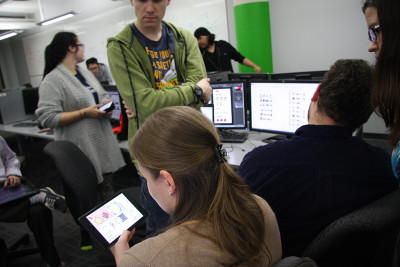
STORY BY RACHEL LEE-THOMAS
The SCAET wing was a beehive of activity in early November as Game Design students from all years participated in Sheridan’s fourth biannual Sprint Week.
Working together in groups of four or more, students put their heads together to design a themed game in five days.
Sprint Week happens once during each semester.
“In any program, there’s not enough opportunity to make things,” said Angela Stukator, Animation and Game Design associate dean. “It is extremely important for students to have lots of experience making games.”
Two hundred students were split into 33 groups November 2. The first years were kept separate, working on board and card games, while higher years worked on games with elements of design.
“We get the entire week off classes but there’s just as much time and dedication as a regular school week,” said second-year student Mana Dumonkowski. “Typically, we take on different roles so it’s not as overwhelming. This year I’m in charge of the concept art.”
This year, there are no grades involved in the Sprint Week, but it provides a fantastic opportunity for experience and building a portfolio.
One of the first Sprint Week themes was Halloween, and had games involving candy.
“Last year we had the opportunity to make games for a hospital waiting room,” Stukator explained. “We were approached by Bloor View Hospital, and we had to see how we could create a game that engaged patients while waiting for their appointment.”
A floor was built that could be triggered by movement or touch, and the students were challenged to design an interface that would be impacted by such.
“Since it was for disabled youth and many of them have mobility problems, we had to make a game that would be compatible with a giant floor pad,” Dumonowski said. “We also had to do something that wouldn’t pass a lot of germs around. We designed small interactive squares that, when stepped on, would trigger activity up on screen.”
It marked the first time the department worked with a group outside of Sheridan.
This year, Sprint Week was sponsored by the Sheridan Centre for Elder Research.
The students were challenged to create a game inclusive to both seniors and teenagers, incorporating teamwork and communication.
“Social isolation is a growing concern as it relates to older adults,” said Pat Spadafora, director of the Centre for Elder Research. “The societal challenge became the basis of a project in which the game design students would create prototypes of intergenerational games to create social inclusion.”
“We’re hoping to have some teens and elderly in for testing, and then final decisions will be made later,” Stukator said.
